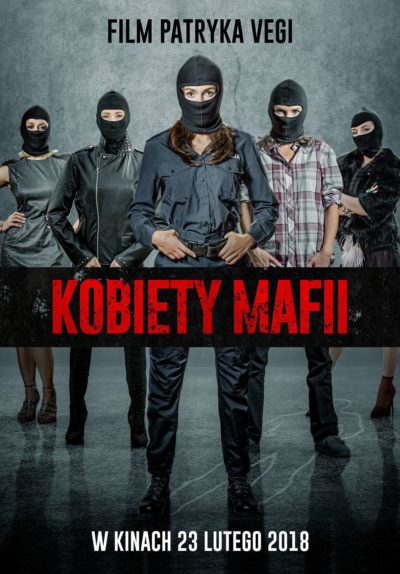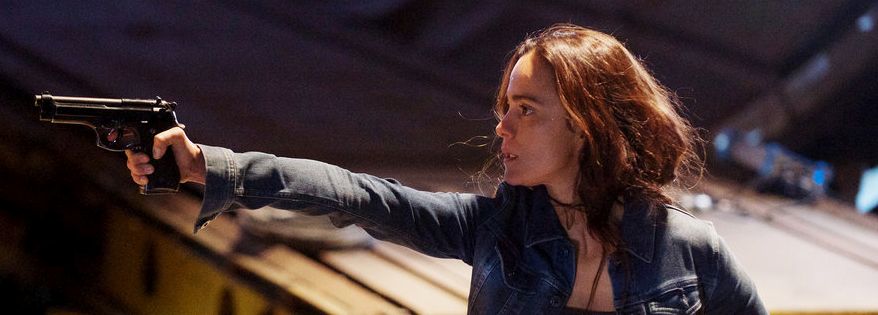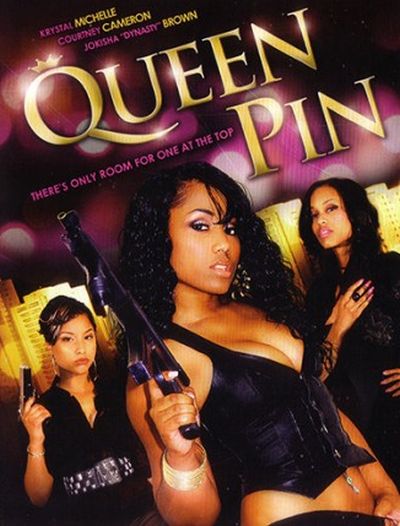★★½
“Mums of Anarchy”
 The leader of all-girl biker gang the Hellcats is brutally beaten and murdered, by Repo (Kosobucki). Her replacement, Kat (Neeld), tries to get to the bottom of the killing, and take vengeance on the perpetrators. Complicating matters is Repo’s position in the Vipers, another motorcycle club with whom the Hellcats have previously had generally friendly relations. Part of that is due to Kat’s on-again, off-again relationship with their leader, Snake (Kabasinski); he also has the advantage of being cosy with some of the local cops, who divert confiscated drugs back to the Vipers for resale. But was he aware of – or did Snake perhaps even order? – Repo’s actions?
The leader of all-girl biker gang the Hellcats is brutally beaten and murdered, by Repo (Kosobucki). Her replacement, Kat (Neeld), tries to get to the bottom of the killing, and take vengeance on the perpetrators. Complicating matters is Repo’s position in the Vipers, another motorcycle club with whom the Hellcats have previously had generally friendly relations. Part of that is due to Kat’s on-again, off-again relationship with their leader, Snake (Kabasinski); he also has the advantage of being cosy with some of the local cops, who divert confiscated drugs back to the Vipers for resale. But was he aware of – or did Snake perhaps even order? – Repo’s actions?
This is a mix of elements that work well, and those that don’t. The characters and performances aren’t bad. Neeld nails the right “do not mess with me” attitude – even if it seemed as if some of her tattoos were rubbing off on occasion! – looking and acting the part required, as well handling the action required better than I anticipate. And normally, a director putting himself in his own film is a red flag which screams “vanity project”, yet Kabasinski is equally solid in his role. Though disturbingly, he reminded me of Axl Rose some of the time. To varying degrees, this compatibility extends throughout the cast, e.g. the cops look like cops. You’d be surprised how often that is not the case in low-budget films.
Yet other aspects come up short. Most obviously: for a biker movie, it has a remarkable lack of… well, bikes. In fact, while I may have blinked and missed it, I don’t think there is a single shot of a Hellcat on, or indeed anywhere near, a motorcycle, at any point in the film. There’s also an ambivalent approach to female nudity. While there are plenty of that low-budget staple, the strip-club scene, the men involved are strikingly bored by it. Which may be the point: yet if they’re not interested, why should viewers be? And Neeld remains resolutely clothed. If you’re going to tout having a Playboy cover-girl in your B-movie… Well, it’s not unreasonable to expect a bit more than (admittedly, impressive!) cleavage.
There are other problems: the scenes don’t flow into one another, and some seem to have needless padding in them. Here’s an example: in one sequence, Kat is being briefed by her lieutenant Stone at a railway station. Six words of meaningful dialogue are preceded by twenty seconds of Stone walking along the platform to reach her boss. In terms of content, there’s simply isn’t enough here for the length, not least because we know from the start who the perpetrator was, significantly reducing the mystery. Sure, there’s a twist, though since even I could see it coming, it won’t be sitting beside The Sixth Sense in cinematic history. Given the obviously limited resources, this still isn’t bad, and I’d not mind seeing more of Neeld. However, my attention was held only intermittently throughout, rather than consistently.
Dir: Len Kabasinski
Star: Lisa Neeld, Len Kabasinski, Deborah Dutch, Mark Kosobucki





 This is based on a TV series from Britain, which ran for two seasons in the eighties – I’ve seen it, but for some reason never got round to writing about it. The show would have been right in our wheelhouse, being written by Lynda LaPlante, who also created
This is based on a TV series from Britain, which ran for two seasons in the eighties – I’ve seen it, but for some reason never got round to writing about it. The show would have been right in our wheelhouse, being written by Lynda LaPlante, who also created  A painfully clunky mix of spy and crime thrillers, this really needs to decide which it wants to be. Alexandria Kingston – code name Griffin, in case you hadn’t guessed – was an abused child, with the good fortune to be rescued and brought up by Margaret Murphy, the head of Irish organized crime in Boston. Though to avoid Alex being targeted for leverage, she was never acknowledged to be part of the family. As an adult, Alex joined the CIA and became a top field agent, jet-setting over the globe on demand. But when her foster mother suffers a stroke, she returns to Boston to find herself in the middle of a war for control of the turf. The rival Killeen clan, sensing an opportunity, pounce. It’s up to Alex and her brothers to defend the family – and then take the battle to the Killeens.
A painfully clunky mix of spy and crime thrillers, this really needs to decide which it wants to be. Alexandria Kingston – code name Griffin, in case you hadn’t guessed – was an abused child, with the good fortune to be rescued and brought up by Margaret Murphy, the head of Irish organized crime in Boston. Though to avoid Alex being targeted for leverage, she was never acknowledged to be part of the family. As an adult, Alex joined the CIA and became a top field agent, jet-setting over the globe on demand. But when her foster mother suffers a stroke, she returns to Boston to find herself in the middle of a war for control of the turf. The rival Killeen clan, sensing an opportunity, pounce. It’s up to Alex and her brothers to defend the family – and then take the battle to the Killeens. We watched this Spanish film, by coincidence, on the same night as
We watched this Spanish film, by coincidence, on the same night as  A sold enough entry, this benefits from a well-written script, but gets marks taken off for having a heroine who is rather too passive. Yolanda Acosta (Paleta) is sent to a higher security facility when she is recaptured, following an escape from her previous prison. It’s a mixed-gender facility (common in Mexico), and she comes to the attention of Benedictino Suárez (Zurita), a.k.a. “Centaur”, a local crime boss who is also incarcerated. He falls hard for Yolanda – the title translates as “Centaur’s Woman” – and when his escape plan comes to fruition, offers to bring her along with him, to the ranch on which he’s hiding out. And that’s where the problems really start for Yolanda.
A sold enough entry, this benefits from a well-written script, but gets marks taken off for having a heroine who is rather too passive. Yolanda Acosta (Paleta) is sent to a higher security facility when she is recaptured, following an escape from her previous prison. It’s a mixed-gender facility (common in Mexico), and she comes to the attention of Benedictino Suárez (Zurita), a.k.a. “Centaur”, a local crime boss who is also incarcerated. He falls hard for Yolanda – the title translates as “Centaur’s Woman” – and when his escape plan comes to fruition, offers to bring her along with him, to the ranch on which he’s hiding out. And that’s where the problems really start for Yolanda.
 This is new territory for me, being the first Polish film to qualify here. Turns out, director Vega has, largely single-handedly, driven a bit of a new wave of cinema from that country. Rather than the lugubrious dramas of Krzysztof Kieślowski, Vega is more like Guy Ritchie, making violent gangster flicks. In this case, the script came with direct input from the gangsters themselves, one of whom contacted Vega after being annoyed by their portrayal in a previous movie. Probably wisely, he opted to take their criticisms on board here…
This is new territory for me, being the first Polish film to qualify here. Turns out, director Vega has, largely single-handedly, driven a bit of a new wave of cinema from that country. Rather than the lugubrious dramas of Krzysztof Kieślowski, Vega is more like Guy Ritchie, making violent gangster flicks. In this case, the script came with direct input from the gangsters themselves, one of whom contacted Vega after being annoyed by their portrayal in a previous movie. Probably wisely, he opted to take their criticisms on board here… Pageants and drug cartels may not seem like topics that combine, but in South and Central America, they’re perhaps closer than you’d think. El Chapo’s third wife, Emma Coronel Aispuro, was a Mexican beauty queen. In 2013, the previous year’s winner of the “Sinaloa Woman” pageant, Maria Susana Flores, was killed in a clash with police.
Pageants and drug cartels may not seem like topics that combine, but in South and Central America, they’re perhaps closer than you’d think. El Chapo’s third wife, Emma Coronel Aispuro, was a Mexican beauty queen. In 2013, the previous year’s winner of the “Sinaloa Woman” pageant, Maria Susana Flores, was killed in a clash with police.  We arrived here with Teresa Mendoza (Braga) having gunned down Don Epifanio, and made an implacable enemy of his estranged wife, Camila Vargas (Falcon). Epifanio had become the Governor of Sinaloa, a position Camila took over, using it to buttress her position at the top. She formed alliances on both sides to assist her further: notably General Cortez (Arias), who provided military muscle, and with DEA agent Alonzo Loya, to whom she fed intelligence about her rivals. However, Camila’s increasingly strained relationship with her teenage daughter ends up being used against her.
We arrived here with Teresa Mendoza (Braga) having gunned down Don Epifanio, and made an implacable enemy of his estranged wife, Camila Vargas (Falcon). Epifanio had become the Governor of Sinaloa, a position Camila took over, using it to buttress her position at the top. She formed alliances on both sides to assist her further: notably General Cortez (Arias), who provided military muscle, and with DEA agent Alonzo Loya, to whom she fed intelligence about her rivals. However, Camila’s increasingly strained relationship with her teenage daughter ends up being used against her.
 That’s the voice-over with which this starts, segueing into a bit of nude interpretive dance – well, semi-nude, the guy keeps his Y-fronts on, for which I am grateful – that has absolutely no relation to the rest of the film. At its core, this is a battle of triad versus triad: one overseen by Lau, the other by Fung. The former is assassinated, and his daughter, Angel (Yeung) takes over – she’s also keen to track down the perpetrators, with the most obvious beneficiary being Fung. But not so sure is Fung’s right-hand man, Jimmy Lee (Lee), who was there for the killing, and helps Angel’s investigation.
That’s the voice-over with which this starts, segueing into a bit of nude interpretive dance – well, semi-nude, the guy keeps his Y-fronts on, for which I am grateful – that has absolutely no relation to the rest of the film. At its core, this is a battle of triad versus triad: one overseen by Lau, the other by Fung. The former is assassinated, and his daughter, Angel (Yeung) takes over – she’s also keen to track down the perpetrators, with the most obvious beneficiary being Fung. But not so sure is Fung’s right-hand man, Jimmy Lee (Lee), who was there for the killing, and helps Angel’s investigation. Rhanni (Brown) falls for the notorious Florida drug-dealer Seven (Bird) hard – to the extent she’s prepared to overlook the fact he’s married. Instead, she becomes his best friend, and works alongside him in the pharmaceutical business. When he is gunned down by his rivals, Rhanni decides to take what she has learned and put it into practice. She assembles her team of loyal but brutal associates, and sets out to take over the town. This brings her unwanted attention from two groups. Firstly, the authorities, who are always seeking to snare one of her underlings, and get him to snitch on his boss. More lethally, there’s the mysterious “Genie”, the current top dog, whose face no-one has seen. Genie sends Lil’ Miller (Michele) to take out Rhanni, only for the hitwoman to throw her lot in with the intended target.
Rhanni (Brown) falls for the notorious Florida drug-dealer Seven (Bird) hard – to the extent she’s prepared to overlook the fact he’s married. Instead, she becomes his best friend, and works alongside him in the pharmaceutical business. When he is gunned down by his rivals, Rhanni decides to take what she has learned and put it into practice. She assembles her team of loyal but brutal associates, and sets out to take over the town. This brings her unwanted attention from two groups. Firstly, the authorities, who are always seeking to snare one of her underlings, and get him to snitch on his boss. More lethally, there’s the mysterious “Genie”, the current top dog, whose face no-one has seen. Genie sends Lil’ Miller (Michele) to take out Rhanni, only for the hitwoman to throw her lot in with the intended target.